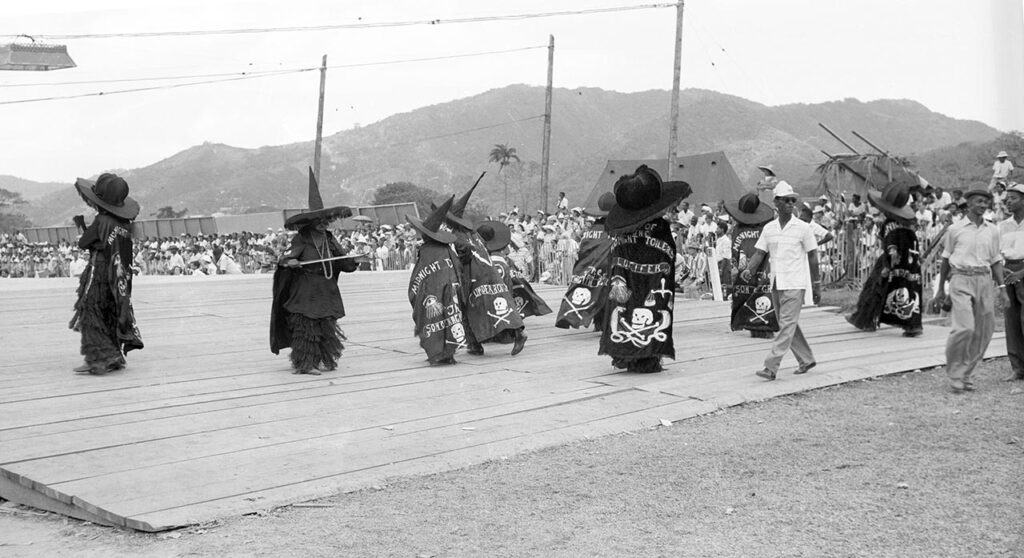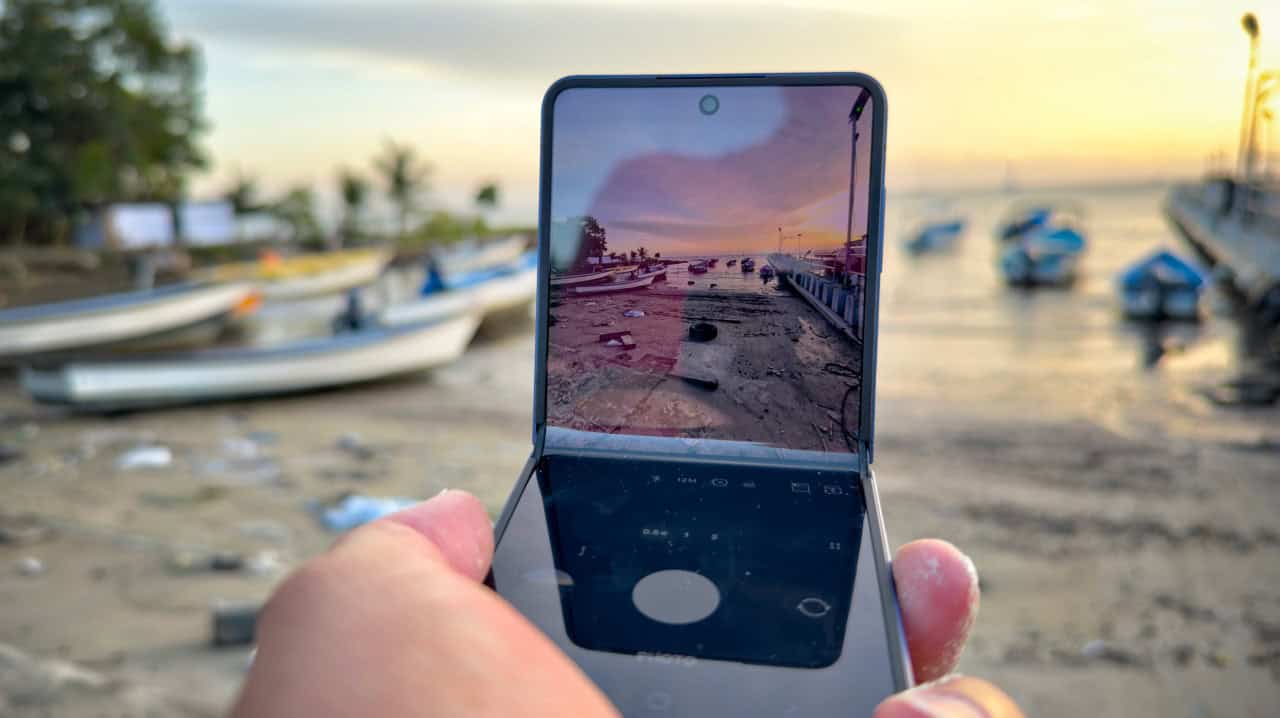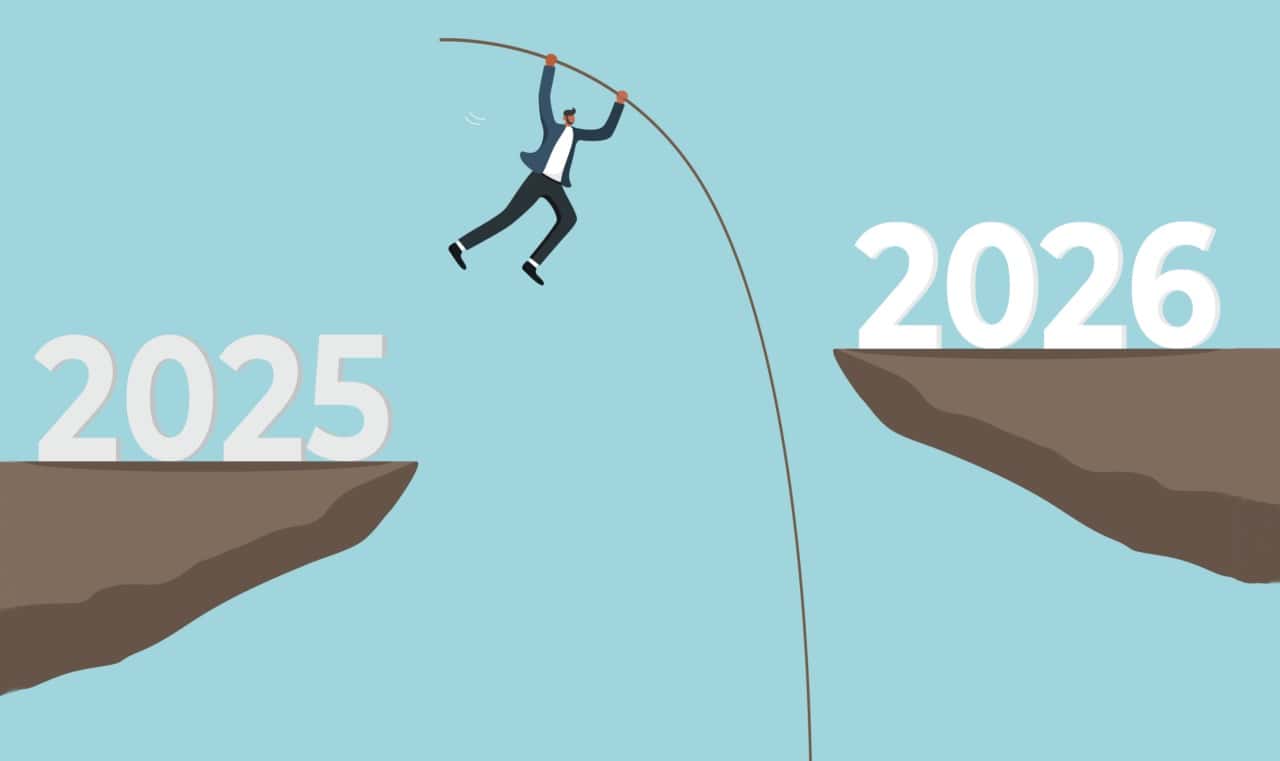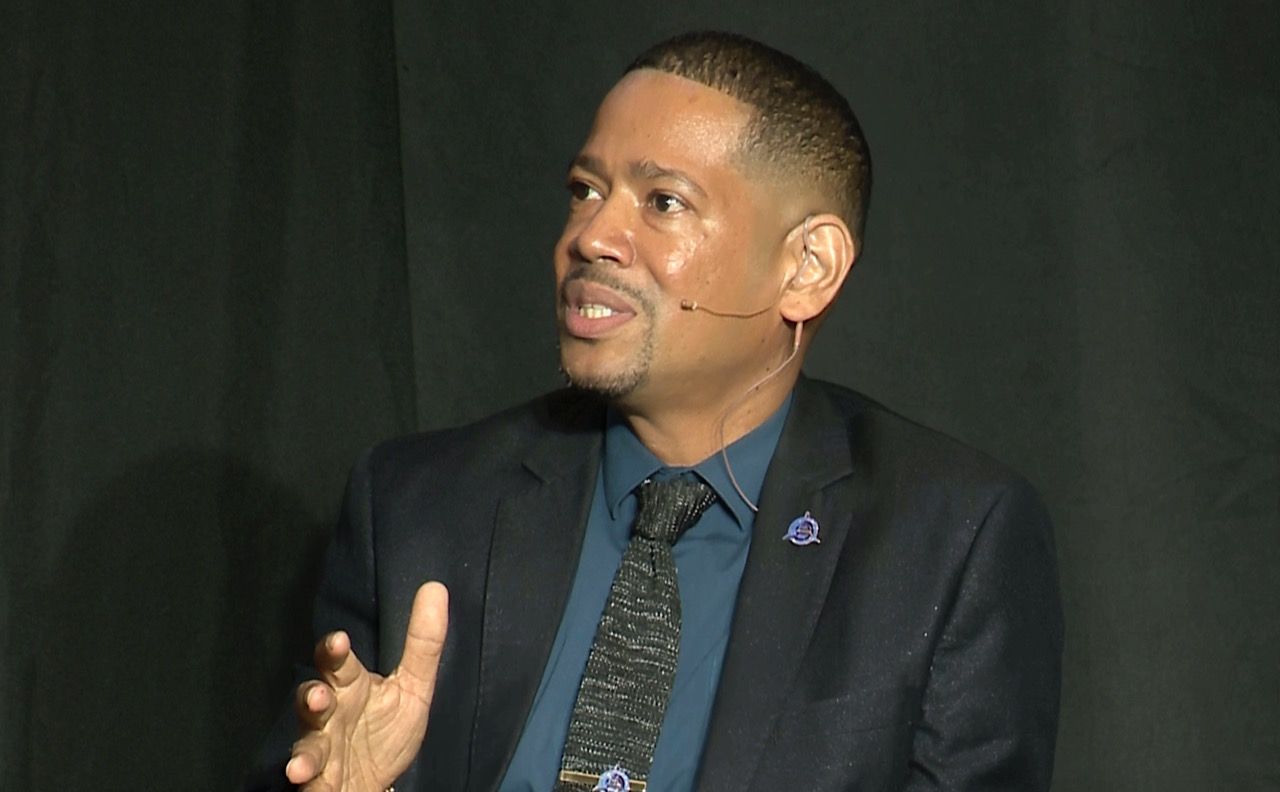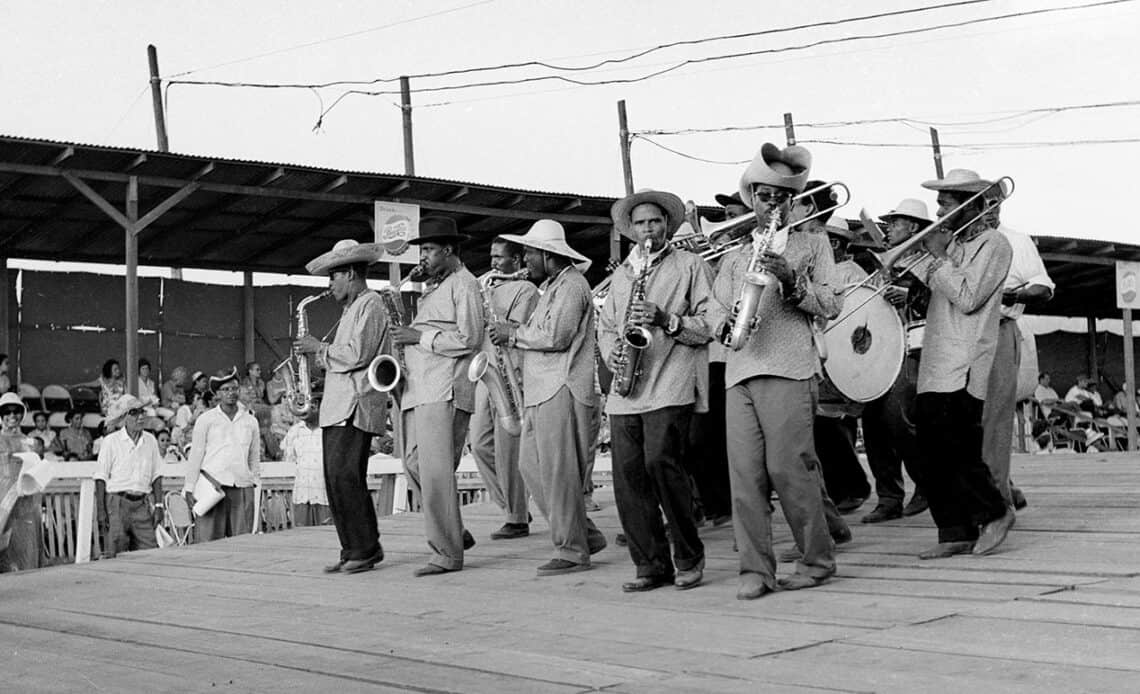
Above: Carnival band musicians, Queen’s Park Savannah, circa 1957. Photograph by Kingsley Lyndersay. The digital interpretations of Kingsley Lyndersay’s images are administered by Mark Lyndersay, © copyright 2020, all rights reserved.
BitDepth#1447 for February 26, 2024
On the track leading to the Savannah stage this year was a re-imagining of the Carnival village was built and named after John Cupid. It’s safe to say that almost nobody had no idea who he was and even fewer had met him.
Early in my career as a photographer, I’d often find myself working with Cupid on one cultural project or another, most of them an impenetrable mix of the eccentric and whimsical.
I was far too young to understand the importance of what he was trying to do. On one memorable occasion, he led me around the San Fernando cemetery, pointing out headstones he wanted photographed.
On another, he walked beside Michael Jackson during a rest day after The Jacksons had performed at Skinner Park and the Grandstand, strolling along with the pop star from the top of the hill in Laventille all the way to the bottom as the fascinated MJ greeted confused residents and chatted with them on their porches.
Those photographs left this country undeveloped, destined for the archives at what would become Neverland.
John Cupid was a champion of local culture, fiercely and to such an extent that he eventually became identified by those who disagreed with his approach as a “culture vulture.”
While he was passionate, he wasn’t dogmatic. His appreciation of culture acknowledged that it was a confluence of inspirations, which in turn would lead to other tributaries.
Over the years that derisive use of the term led to a slow depreciation of its use, in favour of today’s arguments about ritual and tradition, particularly as they are used to describe various aspects of the recently concluded Carnival.
Rituals are normally clearly articulated practices based in faith or worship that reinforce a particular worldview.
Traditions are practices that are passed on from generation to generation.
Events are gatherings or incidents that command the attention of groups of people.
Carnival, restaged every year and culminating in the two days of street parades preceding Ash Wednesday, has always been a messy mix of all three, with a heady dose of a fiercely individualistic culture mixed in.
Trinidad and Tobago hosts an abundance of culturally specific festivals and a long tradition of assimilating and adapting them to our particular tastes, so it shouldn’t be surprising to find that Carnival is subject to continuous adaptation and evolution.
That’s led to tensions such as arguments about the challenge that efficient, customer-focused costume bands produced using production line systems pose to much smaller, handcrafted bands.
There are similar flashpoints in the soca and calypso debate (running for more than 50 years now) and among proponents of stush and wotless feteing.
The state may have no role in the Carnival party business, but its hands weigh heavily on the scales of masquerade and music often in poorly understood ways.
When I was a child, Carnival was still very much a “road made to walk” event. Bands were sometimes small and local, parading through a small sector of the city centre, though they were free to jump up wherever the whimsy took them.
The Grandstand stage was the Trinidad Guardian’s solution to the problem of this scattered festival, attracting bands to a central location with prizes for appearing there.
Other parts of the city centre, keen to have both bands and their audience in their spaces, followed suit and the modern Carnival parade route was born.
The formalisation of this arrangement was the work of the state, working through the Carnival Development Committee, creating rules and structure with an intricate prize giving process and appearance fee regime, centralising control of what was, until then, a spontaneous, grass-roots celebration that coalesced around its creators.
Popular calypsonians gathered their peers into successful calypso tents.
Steelbands, then fiercely territorial, had their energies harnessed to the bridle of formal competition, their music encouraged to become the weapon of choice.
This is clearly, a maddeningly broad synopsis of early Carnival development. There’s a reason why there is now a degree course in Carnival Studies at UWI.
But these aspects of Carnival’s development are interesting to me and inform my concerns about the festival’s evolution.
The state’s involvement in the bureaucratic engine room of the festival and its insistence on a moribund idea of order increased slowly and incrementally over decades.
Stakeholder organisations, created to represent sectors to the state in NCC discussions, were co-opted into an idea of a Carnival that was largely decided on behind closed doors at the CDC and later, the NCC. This was not consensus, it was a kind of creative coup.
It also created a festering miasma of deliberate kleptocracy and unintentional consequences.
Not all traditions are worth carrying on.
For decades, we set aside the fruits of our calypsonians’ labours promptly at midnight on Carnival Tuesday, consigning them to an icebox from which many would never thaw.
Ever wonder why there are no wooden poles with decorations in modern bands? It’s because of what pretty young women did with them when they saw live television cameras trained on them.
I’m no prude, but I found myself far too often at stage side lowering my camera with a hot flush of embarrassment when presented with those ‘photo opportunities’ of the last decade of the 20th century.
Competition may have stopped steelband clashes, but the system tied bands and their players to a never-ending boom and bust cycle of chasing two months of numbing rehearsals, appearance fees and payouts that amount to nothing less than hush-up money.
What Carnival needs is a serious rethinking of its entrenched competition economy and a serious consideration of the value of moving funding to the structured, creator-friendly framework used by the best Arts Council programmes.
If the millions spent on Panorama, for instance, were invested in year-long programmes in panyards that emphasised accountability targeting sensible outcomes like instrument training, sight reading and community outreach, it could fundamentally change the direction of the steelband movement.
The successful bands in such programmes could then be free to play for pride of place from a position of strength.
But if the NCC can’t submit audited accounts for two decades, how would it impose a new kind of measured, year-long monitoring of government spending on the festival that would be necessary for real community development?
We may lament the loss of so many seminal creators of individual Carnival art-forms and performances, but I watched the last of original Minstrels, Bats and Midnight Robbers fight for a few minutes on the Grandstand stage only to be ignored by the Grandstand audience and finally drowned out by the DJs and roaring truck motors of big band presentations before being firmly escorted off the stage.
If the Savannah stage is no longer a hallowed ground in modern Carnival, with its diminishing and dissatisfied audiences, it’s because we soiled it repeatedly with an arch arrogance and ignorance led by the CDC then the NCC.
Anyone who demonstrates the slightest bit of independent, divergent or entrepreneurial thinking in their approach to the festival is demonised.
From Kurt Allen’s Barrackyard to Dean Ackin’s Tribe, stepping off Carnival’s prescribed paths invites contempt and rejection by the festival’s officials.
Where is the courage to sensibly fund and support those aspects of Carnival that are genuine ritual and not mere facsimile?
Where is the wisdom to accept new traditions that supplant the old?
Where is the common-sense to separate events from culture and to understand that hosting the one doesn’t create the other?
Carnival is struggling to change, but the fetters of the state and its willingness to spend without accountability or direction bind its creators to an uncomfortable and directionless harness.

